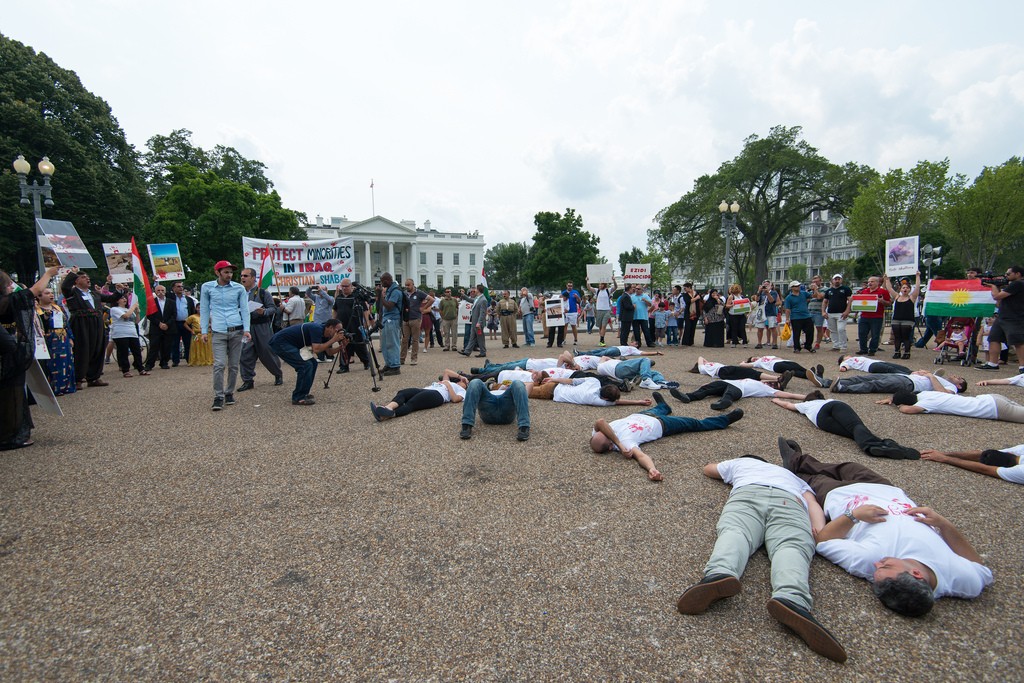
Seven foreigners who worked in Korea joined the Islamic State or ISIS following their sojourns in Korea, the country’s main spy agency said Wednesday, and the intelligence community is trying to track their activities.
The National Intelligence Service (NIS) and the ruling Saenuri Party held a meeting Wednesday morning to discuss the delayed passage of an anti-terrorism bill. The NIS provided its latest assessment of terrorist threats to the lawmakers.
Rep. Lee Cheol-woo, the ruling party’s chief representative on the National Intelligence Committee, briefed reporters following the meeting.
“Korea deported 51 people over the past five years over terrorism allegations including [having ties with] ISIS,” Lee said.
Apart from the deportations, seven foreign workers joined ISIS after they left the country.
“After joint investigations with the intelligence agencies of the home countries of the foreign workers who left Korea in 2014 and 2015, seven of them ended up joining ISIS,” an NIS official was quoted as saying. “We are still investigating specifics of their activities during their stays in Korea.”
The information was an update from an NIS briefing to the National Assembly last November.
At the time, the NIS said 48 foreigners were deported over the past five years after they were identified as members of terrorist groups. One Indonesian worker joined ISIS after leaving Korea, the NIS said.
All seven of the foreign workers who joined ISIS left Korea for Turkey and then traveled to Syria, the NIS said Wednesday.
The NIS urged passage of the delayed counterterrorism bill.
“The anti-terrorism law is intended to protect the lives of our citizens,” Kim Soo-min, second deputy director of the NIS, said at the meeting. “It should never be the subject of a political bargain.”
A counterterrorism bill was introduced to the legislature in 2001 after the Sept. 11 attacks in the United States, but the National Assembly never passed it as liberal lawmakers were concerned about possible abuse of power by authorities, particularly the NIS. As of now, the country’s counterterrorism operations are managed under a presidential instruction issued in 1982.
Kim said it is necessary to collect information on terrorist organizations’ human networks and means. “But the basic investigative rights to go after terrorists such as wiretapping and money tracking have disappeared from the bill because of the groundless argument that the NIS’s authority will be too strong,” Kim said.
“The NIS made concession because passage was so important, but it went nowhere,” Kim said.
The ruling party supported the NIS’s appeal. “The NIS must play the central role in counterterrorism activities,” Rep. Kim Jung-hoon, chief policymaker of the Saenuri Party. “It is natural for the NIS to have the legitimate right to collect information and serve as the counterterrorism center.”
“When a tip came, following it up and merely deporting the suspect cannot prevent terrorist attacks,” said Rep. Kim Tae-won after the meeting. “The anti-terrorism bill must be approved as soon as possible to allow the government to collect information and act preemptively.”
Meanwhile, the National Police Agency also proposed measures to reinforce its counterterrorism capabilities. The police agency said it will newly open a regional policy agency to oversee the northern Gyeonggi area near the inter-Korean border.
“There is a high risk of provocation or terrorist attack by the North in northern Gyeonggi, but the Gyeonggi Provincial Police Agency located in Suwon, southern Gyeonggi, has the jurisdiction,” Police Commissioner General Kang Sin-myeong. “We will reinforce our counterterrorism capabilities in northern Gyeonggi by upgrading the unit in the area.”
BY CHOI SUN-WOOK, SER MYO-JA [ser.myoja@joongang.co.kr]



![Column: An Era When Green Card Interviews End in Handcuffs (Left) Tae-ha Hwang and wife Xelena Diaz at the USCIS Los Angeles office, where Hwang was detained mid-interview. (Right) The marriage certificate submitted for Hwang’s marriage-based residency petition. The photo has been blurred for privacy reasons. [Courtesy of Xelena Diaz]](https://www.koreadailyus.com/wp-content/uploads/2025/12/1208-newsletter-Hwang-100x70.jpg)
